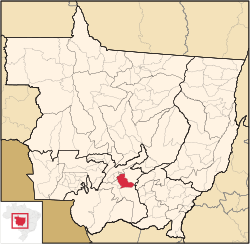Cuyabá
| Cuiabá | |||
|---|---|---|---|
| Municipality | |||
| The Municipality of Cuiabá | |||
 |
|||
|
|||
| Nickname(s): Cidade Verde ("Green City") | |||
| Motto: Capital da Amazônia Meridional (Capital of the Southern Amazon) | |||
 Location in Mato Grosso |
|||
| Location in Brazil | |||
| Coordinates: 15°35′45″S 56°05′49″W / 15.59583°S 56.09694°WCoordinates: 15°35′45″S 56°05′49″W / 15.59583°S 56.09694°W | |||
| Country |
|
||
| Region | Central-West | ||
| State |
|
||
| Founded | April 8, 1719 | ||
| Government | |||
| • Mayor | Emanuel Pinheiro (PMDB) | ||
| Area | |||
| • Municipality | 3,291 km2 (1,271 sq mi) | ||
| Elevation | 165 m (541 ft) | ||
| Population (July 1 2017) | |||
| • Municipality | 590,118 | ||
| • Density | 180/km2 (460/sq mi) | ||
| • Metro | 895,007 | ||
| Demonym(s) | cuiabano | ||
| Time zone | UTC-4 (UTC-4) | ||
| • Summer (DST) | UTC-3 (UTC-3) | ||
| Postal Code | 78000-000 | ||
| Area code(s) | (+55) 65 | ||
| Website | Cuiabá, Mato Grosso | ||
Cuiabá (Portuguese pronunciation: [kujaˈba]) is the capital city of the Brazilian state of Mato Grosso. It serves as the Geographical Centre of South America and forms the metropolitan area of the state, along with the neighbouring town of Várzea Grande.
The city was founded in 1719, during the gold rush, it has been the state capital since 1818. The city is a trading centre for an extensive cattle-raising and agricultural area. The capital is among the fastest-growing cities in Brazil, followed by the growth of agribusiness in Mato Grosso, despite the recession that is affecting Brazilian industries.
Cuiaba is the heart of an urban area that also includes the state's second largest city, Várzea Grande. Thermal electric and hydroelectric plants located in the area have been expanded since the completion of a natural gas pipeline from Bolivia in 2000. The city is the seat of the Federal University of Mato Grosso and the largest soccer stadium of the state, Arena Pantanal.
The city is a rich mix of European, African and Native American influences and numerous museums reflect this. Cuiabá is also notable for its cuisine, dance, music and craftwork. Known as the "Southern gate to the Amazon", Cuiabá experiences a hot humid tropical climate. Cuiabá was one of the host cities of the 2014 FIFA World Cup.
Cuiabá was founded on January 1, 1727 by Rodrigo César de Menezes, then the "captain" of the captaincy of São Paulo in the aftermath of the discovery of gold mines. The Rosário Church built at the time in the centre of the little town marked the location of a rich seam of gold. However, in 1746 much of the town was destroyed by an earthquake.
...
Wikipedia



